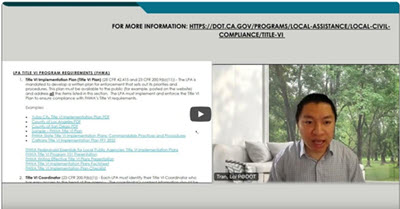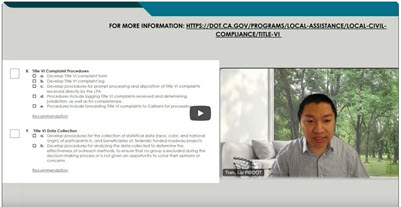Federal Highway Administration (FHWA) Title VI Local Agency Requirements
Local Public Agencies (LPAs) that receive FHWA funds through Caltrans are required to establish a Title VI program that is subject to review by Caltrans pursuant to 23 CFR 200.9(b)(7). The purpose of the program is to prohibit discrimination and ensure non-discrimination through establishing policies and procedures and conducting regular program reviews.
The Caltrans Division of Local Assistance, Office of Local Civil Compliance (LCC) monitors LPAs receiving FHWA funds for Title VI compliance. The following is a listing of items that are required as part of an LPA’s Title VI program.
Check out the tools below to help ensure LPAs' Title VI programs meet FHWA's requirements.
Title VI Compliance Guide for Local Public Agencies
Title VI Compliance Guide for Local Public Agencies Video
Title VI Compliance Guide for District Local Assistance Engineers and Title VI Coordinators
DLA FHWA Title VI Program Checklist (PDF)
Federal Highway Administration (FHWA) Title VI Program Assessment Report Video
Each LPA subject to Title VI must develop a written plan for enforcement that sets out its priorities and procedures. This plan must be available to the public and must address matters such as the method for selecting recipients for compliance reviews, the establishment of timetables and controls for such reviews, the procedure for handling complaints, the allocation of its staff to different compliance functions, the development of guidelines, the determination as to when guidelines are not appropriate, and the provision of civil rights training for its staff. This plan must be available to the public (for example, posted on the LPA’s website) and address all of the items listed on this webpage.
Examples
- FHWA Title VI Implementation Plan Template Version 1
- FHWA Title VI Implementation Plan Template Version 2
- FHWA Title VI Implementation Plan Template Version 3
- Yuba City Title VI Implementation Plan PDF
- County of Los Angeles PDF
- County of San Diego PDF
- FHWA State Title VI Implementation Plans: Commendable Practices and Procedures
- Caltrans Title VI Implementation Plan FFY 2022
FHWA Federal-aid Essentials for Local Public Agencies: Title VI Implementation Plans
Best Practices for Addressing Title VI in Transportation Projects
FHWA Writing Effective Title VI Plans Presentation
FHWA Title VI Implementation Plans Factsheet
FHWA Title VI Implementation Plan Checklist
The LPA must designate a Title VI Coordinator who has a responsible position in the organization and easy access to the head of the agency. Identification of the Title VI Coordinator must be disseminated to the public via such methods as posting in public areas or on the agency's website.
The LPA must develop a Title VI policy statement for signature by the head of the agency. The statement must give a reasonable guarantee that the programs administered by the agency are conducted in compliance with all Title VI nondiscrimination requirements. The signed statement must be disseminated to the public via such methods as posting in public areas and/or on the agency’s website.
Examples:
The LPA is required to ensure programs and activities normally provided in English are accessible to LEP persons. Each LPA must perform an annual assessment (also referred to as a Four Factor Analysis) to determine if modifications are needed to their programs and activities to ensure meaningful access by LEP persons, culminating in the development of a language access plan (LAP). The LAP must be available to the public (for example, posted on the website).
The four factors are:
- The number or proportion of LEP persons eligible to be served or likely to be encountered.
- The frequency of LEP contacts.
- The nature and importance of the programs, services, or activities provided.
- The resources available for LEP persons.
Examples:
The LPA must develop Title VI information for dissemination to the general public and, where appropriate, in languages other than English. The purpose of the information must be to communicate information about the public's rights under Title VI. Sample information includes, but is not limited to, posters, brochures, flyers, "frequently asked questions" documents, web pages, and the like. Alternative formats must be offered and made available at no cost to the requester, where applicable.
Examples:
- Caltrans Title VI Poster (PDF)
- Caltrans Title VI Poster Spanish (PDF)
- Caltrans and You Brochure – Your Rights Under Title VI and Related Statutes
The LPA must provide Title VI training for all LPA employees every two years. Title VI training should cover what is Title VI, how the LPA implements its Title VI program to meet federal requirements, and what steps to take for handling Title VI complaints, as well as language interpretation (verbal)/translation (written) requests.
Example:
The LPA must include required Title VI assurances (specifically, Appendices A and E of the Title VI Assurances) in all sub-contracts and sub-agreements with federal funds, where applicable. The LPA signed the Title VI assurances as part of Exhibit 4-C, “MASTER AGREEMENT - ADMINISTERING AGENCY-STATE AGREEMENT FOR FEDERAL-AID PROJECTS”.
Note: The LPA will insert the clause of Appendix E of the Title VI Assurance in every federal-aid contract and agreement. The Exhibit 4-C Master Agreement contains Appendices A – D but not Appendix E of the Title VI Assurances. There is a U.S. Department of Transportation Order 1050.2A requirement to add Appendix E, which is not included in Exhibit 4-C.
Examples:
LPAs must develop a Title VI complaint form and a log for Title VI complaints received. In addition, LPAs must develop procedures for prompt processing (including logging Title VI complaints, determining jurisdiction, and determining if the complaint is a Title VI complaint) and disposition of Title VI complaints received directly by the LPA.
Note: Per the FHWA Guidance Memorandum, Processing of Title VI Complaints, dated June 13, 2018, all Title VI complaints received by LPAs are to be forwarded to Caltrans to be submitted to the FHWA Division Office. Title VI complaints should be sent within one business day of receipt via email to Title.VI@dot.ca.gov.
Examples:
- Caltrans Title VI Complaint Process (English/Spanish)
- Caltrans Title VI Complaint Forms (English/Spanish)
- SAMPLE Title VI Discrimination Complaint Log (PDF)
- SAMPLE Title VI Discrimination Complaint Log (Excel)
FHWA Title VI Complaints Presentation
FHWA Title VI - Intentional Discrimination and Disparate Impact Presentation
The LPA must develop procedures for the collection of statistical data (race, color, and national origin) of participants in, and beneficiaries of, federally funded roadway projects, e.g., citizens impacted by relocation and participants that attended the public hearing during an environmental review. For example, the LPA can collect Title VI data of participants at public meetings.
In addition, the LPA must analyze the data collected to determine the effectiveness of outreach methods to ensure that no group is excluded during the decision-making process or is not given an opportunity to voice their opinions or concerns. For example, in analyzing the data collected in the example above, the LPA would determine if the LPA needed to conduct additional outreach to the group(s) who did not attend the public meeting, where these groups make up a good portion of the population.
Examples:
The LPA must develop a program to conduct internal Title VI reviews of program areas and to conduct external Title VI reviews of sub-awardees. This effort ensures both the LPA, and its sub-awardees comply with FHWA’s Title VI requirements.
The LPA must develop an annual Title VI Accomplishments and Goals Report which consists of accomplishments for the past year, and goals for the next year. This report should be made available to the public and when requested by Caltrans.
SAMPLE
Title VI Resources
Contacts
Any local agency questions or comments related to Title VI may be sent to the following contact information:
Local Title VI Coordinator
Office of Local Civil Compliance
Caltrans Division of Local Assistance
Email: dla.titlevi@dot.ca.gov




